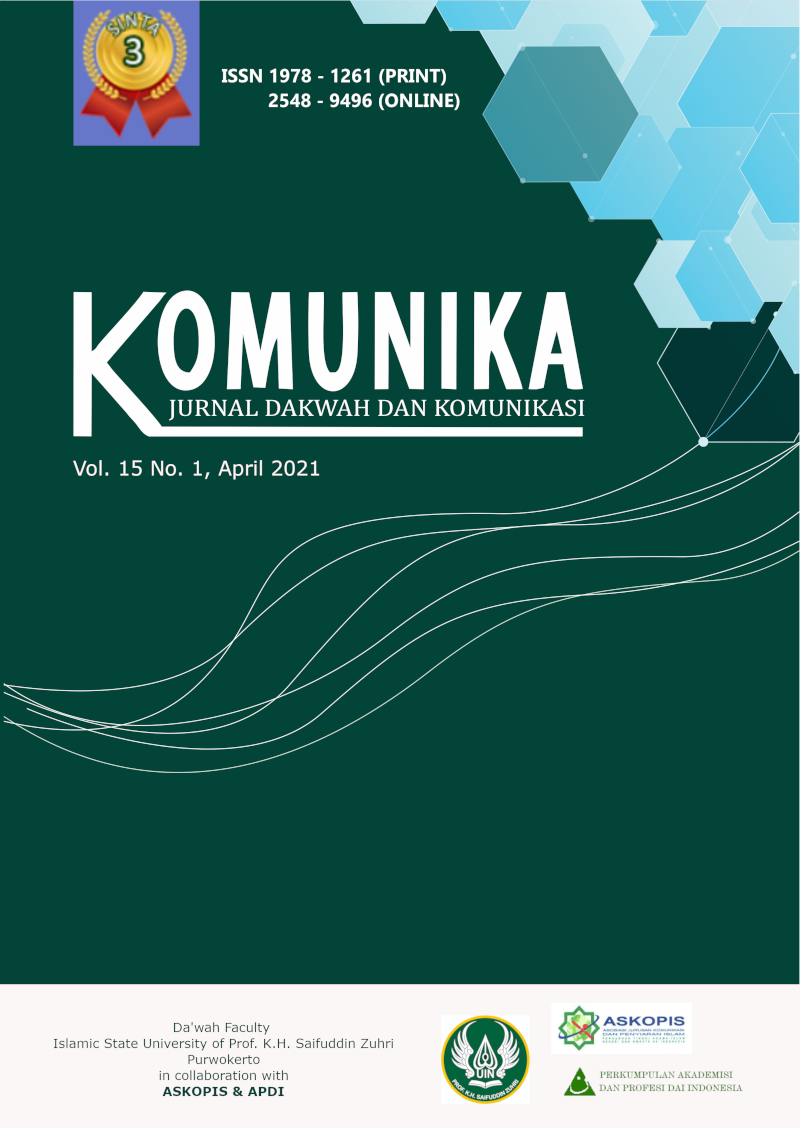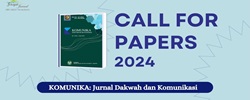Majelis Tafsir Al-Qur'an (MTA) Religion Online for Ideological Da'wa Massification
DOI:
https://doi.org/10.24090/komunika.v15i1.3977Keywords:
Religion online, Da'wa, Community, Islam, WebsiteAbstract
Religious communities use the internet as a spiritual network to seek spiritual goals, and they interpret it through narratives shared through online spaces. This emphasizes the need for freedom and spiritual experiences so that they can share with others. So, people often associate their participation in online religion with a level of spirituality and confirmation of religious identity. Online religion seeks to adapt religion to form a network of spiritual interactions. This study discusses the use of the Internet by Majlis Tafsir Al-Qur'an (MTA) on the website www.mta.or.id in communicating ideology to the congregation. This research data collection uses the method of observation and documentation. The results of this study indicate that the use of digital technology by MTA is to promote ideology. MTA announces content regarding manhaj, terrorism, politics, the spirit of friendship / ukhuwah between members, and cooperation between scholars and the government.References
Ahmad, N. (2014). Tantangan Dakwah Di Era Teknologi Dan Informasi. ADDIN, 8(2), 319-344.
Arake, L. (2012). Pendekatan Hukum Islam Terhadap Jihad dan Teororisme. Jurnal Studi Keislaman (Ulumuna), 16(Juni), 189-222.
Budiantoro, W. (2017). Dakwah di Era Digital. Komunika, 11, No. 2.
Campbell, H. (2005). Making space for religion in Internet studies. Information Society, 21(4), 309-315. https://doi.org/10.1080/01972240591007625
Campbell, H. (2013). Digital Religion. London and New York: Routledge. https://doi.org/10.18500/1819-7671-2018-18-4-377-381
Chozin, M. A. (2013). Strategi Dakwah Salafi di Indonesia. Jurnal Dakwah, XIV(1), 1-25. https://doi.org/10.14421/JD.2013.%X
Effendi, M. (2010). Peranan Internet Sebagai Media Komunikasi. KOMUNIKA: Jurnal Dakwah Dan Komunikasi, 4(1), 130-142. https://doi.org/10.24090/komunika.v3i2.143
Fakhruroji, M., & Muhaemin, E. (2017). Sikap Akademisi Dakwah Terhadap Internet Sebagai Media Dakwah the Attitude of Da'wa Academicians on the Internet As a Preaching Media. Jurnal Sosioteknologi, 16(1), 82-93.
Hackett, R. I. J. (2006). Religion and the internet. Diogenes, 53(3), 67-76. https://doi.org/10.1177/0392192106069015
Holmberg, K., Bastubacka, J., & Thelwall, M. (2018). "@God please open your fridge" Twitter messages to @God in content analysis: Hopes, humor, spirituality, and profanities. Journal of Religion, Media and Digital Culture, 5(2), 339–355. https://doi.org/10.1163/21659214-90000085
Iqbal, A. M. (2014). Internet, Identity and Islamic Movements: The Case of Salafism in Indonesia. Islamika Indonesiana, 1(1), 81. https://doi.org/10.15575/isin.v1i1.42
Jinan, M. (2013). PENETRASI ISLAM PURITAN DI PEDESAAN: Kajian tentang Pola Kepengikutan Warga. Jurnal Studi Islam, Vol. 14, N, 105-124.
Lvheim, M. I. A. (2005). Young People and the Use of the Internet as Transitional Space. Online - Heidelberg Journal of Religions on the Internet, 1(1), 261-262. https://doi.org/10.11588/rel.2005.1.383
Ma'arif, B. S. (2009). Pola Komunikasi Dakwah KH . Abdullah Gymnastiar. Mimbar, XXV(2), 161-180.
Muhammaddin, M. (2013). Manhaj Salafiyah. Jurnal Ilmu Agama, 14(2), 147-161.
Mursyidah, D., & Salim, A. (2012). Dakwah Melalui Media Siber: Analisis Pesan Dakwah dalam Website Dakwatuna . com. Media Akademika, 27(4), 569-586.
Mustofa, M. (2002). Memahami Terorisme: Suatu Perspektif Kriminologi. Jurnal Kriminologi Indonesia, 2(III), 30-38.
Mustolehuddin. (2014). Pandangan Ideologis-Teologis Muhammadiyah dan MTA (Studi Gerakan Purifikasi Islam di Surakarta). Analisa, 21(1), 39-50.
Pardianto. (2013). Meneguhkan Dakwah Melalui. Jurnal Komunikasi Islam, 03, 146-166.
Putra, O. E. (2008). Politik dan Kekuasaan Dalam Islam. Jurnal Manajemen Dakwah, l(1), 108-127.
Rani, J. (2012). Kelemahan-kelemahan dalam Manahij Al-Mufassirin. Jurnal Usuluddin, XVIII(2), 167-178.
Sabbikhis, & Muttaqin, A. W. (2003). 60201-ID-pendidikan-agama-islam-di-sekolah-negeri.pdf. JPI FIAI Jurusan Tarbiyah, IX(VI), 11-18.
Slamet. (2009). Efektifitas Komunikasi dalam Dakwah Persuasif. Jurnal Dakwah, X(2), 179-193.
Sugiyarto, W. (2012). Dinamika Sosial Keagamaan Majelis tafsir Al-Qur'an (MTA) Pusat di kota Surakarta Jawa Tengah. Harmoni, 11(1), 115-128.
Usman, F. (2016). Efektivitas Penggunaan Media Online Sebagai Sarana Dakwah. Jurnal Ekonomi Dan Dakwah Islam (Al-Tsiqoh), 1(1), 1-8.
Wahidin, A., Effendi, R., & Shaleh, K. (2014). Pengaruh Penggunaan Internet Terhadap Religiusitas Mahasiswa Universitas Islam Bandung 1. Prosiding Penelitian Sivitas Akademika Unisba (Sosial Dan Humaniora), 17-24.
Zaini, A. (2013). Dakwah Melalui Internet. Komunikasi Penyiaran Islam, 1(1), 93-108.
Zainuddin, A. (2009). Gerakan Purifikasi Islam Di Surakarta. Studi Islam Program Studi Agama Dan Filsafat.
Zawawi, A. (2015). Politik Dalam Pandangan Islam. Ummul Quro, 5(1), 85-100.
Arake, L. (2012). Pendekatan Hukum Islam Terhadap Jihad dan Teororisme. Jurnal Studi Keislaman (Ulumuna), 16(Juni), 189-222.
Budiantoro, W. (2017). Dakwah di Era Digital. Komunika, 11, No. 2.
Campbell, H. (2005). Making space for religion in Internet studies. Information Society, 21(4), 309-315. https://doi.org/10.1080/01972240591007625
Campbell, H. (2013). Digital Religion. London and New York: Routledge. https://doi.org/10.18500/1819-7671-2018-18-4-377-381
Chozin, M. A. (2013). Strategi Dakwah Salafi di Indonesia. Jurnal Dakwah, XIV(1), 1-25. https://doi.org/10.14421/JD.2013.%X
Effendi, M. (2010). Peranan Internet Sebagai Media Komunikasi. KOMUNIKA: Jurnal Dakwah Dan Komunikasi, 4(1), 130-142. https://doi.org/10.24090/komunika.v3i2.143
Fakhruroji, M., & Muhaemin, E. (2017). Sikap Akademisi Dakwah Terhadap Internet Sebagai Media Dakwah the Attitude of Da'wa Academicians on the Internet As a Preaching Media. Jurnal Sosioteknologi, 16(1), 82-93.
Hackett, R. I. J. (2006). Religion and the internet. Diogenes, 53(3), 67-76. https://doi.org/10.1177/0392192106069015
Holmberg, K., Bastubacka, J., & Thelwall, M. (2018). "@God please open your fridge" Twitter messages to @God in content analysis: Hopes, humor, spirituality, and profanities. Journal of Religion, Media and Digital Culture, 5(2), 339–355. https://doi.org/10.1163/21659214-90000085
Iqbal, A. M. (2014). Internet, Identity and Islamic Movements: The Case of Salafism in Indonesia. Islamika Indonesiana, 1(1), 81. https://doi.org/10.15575/isin.v1i1.42
Jinan, M. (2013). PENETRASI ISLAM PURITAN DI PEDESAAN: Kajian tentang Pola Kepengikutan Warga. Jurnal Studi Islam, Vol. 14, N, 105-124.
Lvheim, M. I. A. (2005). Young People and the Use of the Internet as Transitional Space. Online - Heidelberg Journal of Religions on the Internet, 1(1), 261-262. https://doi.org/10.11588/rel.2005.1.383
Ma'arif, B. S. (2009). Pola Komunikasi Dakwah KH . Abdullah Gymnastiar. Mimbar, XXV(2), 161-180.
Muhammaddin, M. (2013). Manhaj Salafiyah. Jurnal Ilmu Agama, 14(2), 147-161.
Mursyidah, D., & Salim, A. (2012). Dakwah Melalui Media Siber: Analisis Pesan Dakwah dalam Website Dakwatuna . com. Media Akademika, 27(4), 569-586.
Mustofa, M. (2002). Memahami Terorisme: Suatu Perspektif Kriminologi. Jurnal Kriminologi Indonesia, 2(III), 30-38.
Mustolehuddin. (2014). Pandangan Ideologis-Teologis Muhammadiyah dan MTA (Studi Gerakan Purifikasi Islam di Surakarta). Analisa, 21(1), 39-50.
Pardianto. (2013). Meneguhkan Dakwah Melalui. Jurnal Komunikasi Islam, 03, 146-166.
Putra, O. E. (2008). Politik dan Kekuasaan Dalam Islam. Jurnal Manajemen Dakwah, l(1), 108-127.
Rani, J. (2012). Kelemahan-kelemahan dalam Manahij Al-Mufassirin. Jurnal Usuluddin, XVIII(2), 167-178.
Sabbikhis, & Muttaqin, A. W. (2003). 60201-ID-pendidikan-agama-islam-di-sekolah-negeri.pdf. JPI FIAI Jurusan Tarbiyah, IX(VI), 11-18.
Slamet. (2009). Efektifitas Komunikasi dalam Dakwah Persuasif. Jurnal Dakwah, X(2), 179-193.
Sugiyarto, W. (2012). Dinamika Sosial Keagamaan Majelis tafsir Al-Qur'an (MTA) Pusat di kota Surakarta Jawa Tengah. Harmoni, 11(1), 115-128.
Usman, F. (2016). Efektivitas Penggunaan Media Online Sebagai Sarana Dakwah. Jurnal Ekonomi Dan Dakwah Islam (Al-Tsiqoh), 1(1), 1-8.
Wahidin, A., Effendi, R., & Shaleh, K. (2014). Pengaruh Penggunaan Internet Terhadap Religiusitas Mahasiswa Universitas Islam Bandung 1. Prosiding Penelitian Sivitas Akademika Unisba (Sosial Dan Humaniora), 17-24.
Zaini, A. (2013). Dakwah Melalui Internet. Komunikasi Penyiaran Islam, 1(1), 93-108.
Zainuddin, A. (2009). Gerakan Purifikasi Islam Di Surakarta. Studi Islam Program Studi Agama Dan Filsafat.
Zawawi, A. (2015). Politik Dalam Pandangan Islam. Ummul Quro, 5(1), 85-100.
Downloads
Published
2021-04-01
How to Cite
Kusuma, R. S., & Asmorowati, A. D. I. (2021). Majelis Tafsir Al-Qur’an (MTA) Religion Online for Ideological Da’wa Massification. KOMUNIKA: Jurnal Dakwah Dan Komunikasi, 15(1), 13–25. https://doi.org/10.24090/komunika.v15i1.3977
Issue
Section
Articles
License
Authors who publish with this journal agree to the following terms:
- Authors retain copyright and grant the journal right of first publication with the work simultaneously licensed under a Creative Commons Attribution-ShareAlike 4.0 International License that allows others to share the work with an acknowledgement of the work's authorship and initial publication in this journal.
- Authors are able to enter into separate, additional contractual arrangements for the non-exclusive distribution of the journal's published version of the work (e.g., post it to an institutional repository or publish it in a book), with an acknowledgement of its initial publication in this journal.
- Authors are permitted and encouraged to post their work online (e.g., in institutional repositories or on their website) prior to and during the submission process, as it can lead to productive exchanges, as well as earlier and greater citation of published work (See The Effect of Open Access).





















